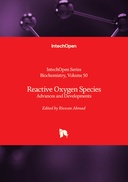Explore

Reactive Oxygen Species (ROS) are molecules generated naturally during cellular metabolic processes. They act as signaling agents that oversee specific biochemical pathways, playing a vital role in cell function and survival. However, an imbalance in ROS signaling or excessive ROS production can have harmful effects on the pathophysiology of diseases. ROS are crucial to cell signaling and are involved in various physiological processes. They modulate gene expression, regulate cell cycle progression, and influence immune responses. Although ROS are essential for normal cellular functions, an overabundance of these molecules can lead to oxidative stress, causing DNA damage, lipid peroxidation, and protein oxidation, adversely impacting cell function and leading to various diseases. Therefore, it is critical to regulate ROS levels precisely to maintain cellular homeostasis. Reactive Oxygen Species - Advances and Developments is a comprehensive book that delves into the intricacies of ROS. It provides invaluable insights to researchers in the field, equipping them with the essential tools and knowledge to advance their work in this critical area, leading to the development of novel therapeutic interventions to manage various illnesses.
This book is included in DOAB.
Why read this book? Have your say.
You must be logged in to comment.
Rights Information
Are you the author or publisher of this work? If so, you can claim it as yours by registering as an Unglue.it rights holder.Downloads
This work has been downloaded 24 times via unglue.it ebook links.
- 24 - pdf (CC BY) at mts.intechopen.com.
Keywords
- Biology, Life Sciences
- Cellular biology (cytology)
- Mathematics & science
- thema EDItEUR::P Mathematics and Science::PS Biology, life sciences::PSF Cellular biology (cytology)
Links
DOI: 10.5772/intechopen.107774Editions

